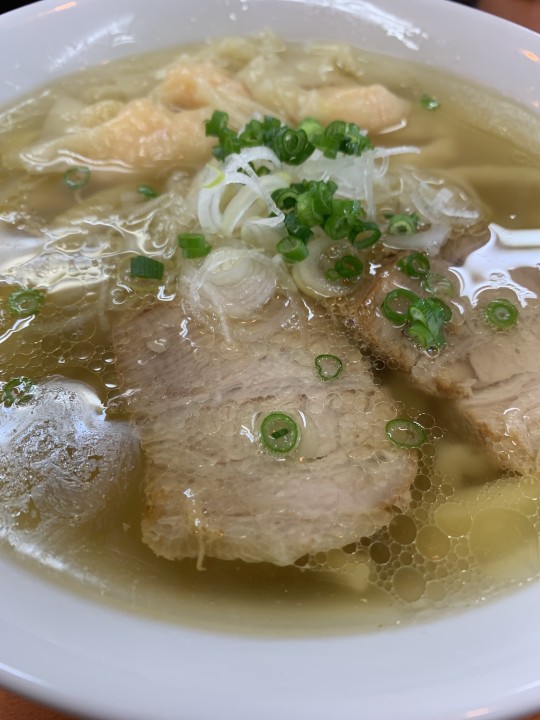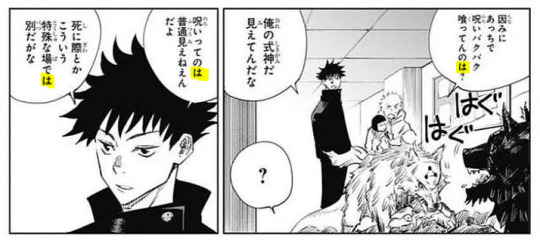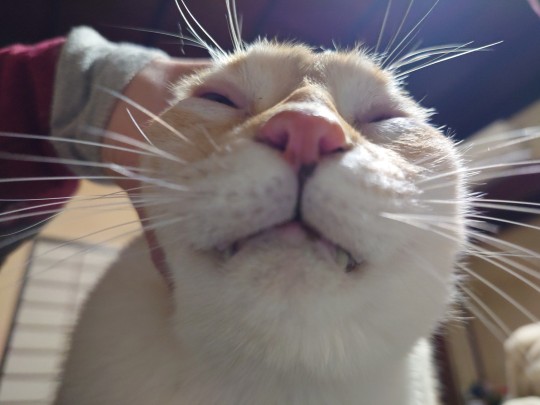#が
Text

2023/2/7火曜日
先日家族に誘われて
人気ラーメン店行ってきたわ
ラーメン屋に並ぶなんて!!初だわ
#海老ワンタンメン#スマホ写真#並んだ#ビックリ#店主一人#モチモチ麺#イタリアンでいうとフイットチーネ#太麺#美味しい#いりこ#削り節#店内に置いてる#でも#塩味の勝ち#ラーメン好きに人気店#が#どうかなあ
44 notes
·
View notes
Text
When to use は and が
A different take on the matter.
Disclaimer* I’m learning Japanese. Don’t take this as the ultimate guide to the Japanese particles! Feel free to correct me!
[known information] は [unknown information]
To determine whether something is known or unknown, you need to closely analyze the context. Japanese is a highly contextual language, and I often catch myself analyzing something without considering the context first. I hope that grammar rules will somehow explain everything to me.
Consider this example:
私はポーランド人です.
私は = known information
ポーランド人 = unknown information
Context: I’m standing in front of you, and I’m introducing myself.
私は is considered "known information" because you can see me. You know exactly who is speaking.
However, you know nothing about me. I’m giving the unknown information: ポーランド人です。
あなたは誰ですか?
Context: You’re standing in front of me, so you’re known information to me. There is something about you that I don’t know, though. You will provide me with the unknown information.
このアニメはどう?
Context: We both watched the same anime. We both know what anime we’re referring to. But I don’t know what you think about it. You’re supplying me with the missing bit of information.
Examples from Jujutsu Kaisen manga

Context: Yuuji and Megumi just arrived in front of the school. Yuuji can feel the pressure given off by the curse.
"The pressure" is known information to both the reader and Yuuji. We can see the dark shadows around the school. “(Damn) … the pressure…”
So, I truly believe that in this case, は matches the use of the English definite article ‘the’ which is also used when both you and the reader / your listener know (see, hear, etc.) the noun in question.

Context: Yuuji is asking about Megumi’s divine dogs.
因みにあっちで呪いパクパク食ってんのは?
They both can see the divine dogs, so it’s known information to both.
Megumi is supplying Yuuji with the unknown information = they are my shikigami.
呪いってのは = Speaking of curses… (curses have already been mentioned. They are “known information”)
の in this case changes 呪いって to gerund.
The rest of the sentence is the unknown information = it’s not common to see them.
The third は also shows us known and unknown information.
死に際とかこういう特殊な場では別だがな
(it’s not common to see them) On deathbeds and special occasions like this, it’s a different case.
Both of them (including us) know what a ‘deathbed’ means and what the current situation is.
Megumi gives us the missing information = it’s a different case (別だがな).
However, in this case we could also apply the contrastive rule of は which always hinges on the context. Contrastive は always introduces some implicit (or it could be even explicit) information – you normally don’t see curses HOWEVER [contrast] when you’re about to die, it’s a different case.
More about とか and で
[known information] は [known information]
It’s a rare case where both pieces of information are known to us. When might something like that happen? Mostly when we state some obvious facts, for example, an idiot will always be an idiot.
バカはバカです
バカ we know what/who バカ is. We repeat the information to our listeners; no surprise here. Both バカ here are the same バカ; it doesn’t mean that a new バカ just showed up.
(Which could be highly possible, considering how many of them are out there ;))
Unfortunately, I don’t have too many examples for this one. Since it’s a rare case, there aren’t too many of those (I guess).
When to use particle が
[unknown information] が [known information]
For starters, a simple sentence:
私が田中先生です。
Context: We are in a conference room full of people, and the speaker is looking for a teacher named Tanaka. We KNOW that there is a teacher named Tanaka. The speaker just told us. That’s our known information.
The unknown information = who identifies as Tanaka sensei. We don’t know what this teacher looks like, so we can’t point to anyone specific. Suddenly, someone stands up and says: "I’m Tanaka sensei!"
In English, we would emphasize this structure with the tone of our voice. You would say “I’m” a little louder and stronger = It’s me! I AM Tanaka sensei.
To use this combination, we need a broader context. You wouldn’t use it to introduce yourself (which doesn’t require any context) because, as we already mentioned, everyone can see you but know nothing about you.
が represents the exact opposite situation. We know something about someone, but we don’t know who that person is.
Another example:
電話が便利です。でんわ が べんり です。
As you can see, the known information is that something is convenient, but we don’t know what.
To determine the context, we can ask a question.
What is useful/convenient?
A telephone is convenient. Now we know.
何が便利ですか?
Note that when we ask questions, we also use が because we have some identifying information. We don’t know, though, what possesses such qualities/features.
Questions words, by their nature, represent unknown things.
One thing that usually pops up in anime is when guys say: 俺がやる!
Oftentimes, all the characters know that something must be done about something. The question is: who’s going to do it?
が for marking wishes/desires

Japanese: A Comprehensive Grammar: Kaiser, Stefan (p. 40).
他の仕事がやりたい!
I want to do a different job.
が for showing what is more important

Japanese: A Comprehensive Grammar: Kaiser, Stefan (p. 42).
Sources:
Japanese: A Comprehensive Grammar: Kaiser, Stefan (p. 40 & 42).
My Japanese teacher and his Japanese teacher
2 notes
·
View notes
Photo

Particles が & は- a different perspective
Disclaimer*
I’m learning Japanese. Don’t take this as the ultimate guide to the Japanese particles!
Feel free to correct me!
Combination #1 & Combination #2
Combination #3
[Unknown information] が [known information]
This time, we're going to discuss particle が and what information it relates to us. For starters, a simple sentence:
私が田中先生です。
Context: We are in a conference room full of people, and the speaker is looking for a teacher named Tanaka. We KNOW that there is a teacher named Tanaka. The speaker just told us. That's our known information.
The unknown information - who identifies as Tanaka sensei. We don't know what this teacher looks like, so we can't point to anyone specific. Suddenly, someone stands up and says: 'I'm Tanaka sensei!'
In English, we would emphasize this structure with the tone of our voice. You would say "I'm" a little louder and stronger - It's me! I AM Tanaka sensei.
To use this combination, we need a broader context. You wouldn't use it to introduce yourself (which doesn't require any context) because, as we already mentioned, everyone can see you but know nothing about you (私は田中先生です. In this case, it's the exact opposite situation. We know something about someone, but we don't know who that person is.
電話が便利です。でんわ が べんり です。
To determine the context, we can ask a question. What is useful/convenient? As you can see, the known information is that something is convenient, but we don't know what. A telephone is convenient. Now we know.
何が便利ですか?
Note that when we ask questions, we also use が because we have some identifying information. We don't know, though, what possesses such qualities/features.
Questions words, by their nature, represent unknown things.
One thing that usually pops up in anime is when guys say: 俺がやる!Often times, all the characters know that something must be done about something. The questions is - who's going to do it?
Hope this helps! :)
17 notes
·
View notes
Text
@furusawayusuke_ 👏 👏 We are immensely proud of your voice. Speak the truth even if you are alone 🍉
Videos: @furusawayusuke_
Song: @zachmatari
#日本#日本人#日本語#パレスチナ#ありがとうございました#ありがとうございます#ガザ地区#ガザ#palestine#gaza#free palestine#israel#jerusalem#i stand with palestine#فلسطين#free gaza#israel is a terrorist state#arabic
30K notes
·
View notes
Text

Today, March 27th, is Uni's 4th birthday!
Please say "Happy Birthday" to Uni :3
8K notes
·
View notes
Text

★ 【土偶ちゃん】 「 青がすんでるーー 」 ☆
✔ republished w/permission
⊳ ⊳ follow me on twitter
7K notes
·
View notes
Text

i'm baaack
7K notes
·
View notes
Text

家主のちゃわん わったのはでしよ!
ねえ!わるいのはでしよ!!
The cat broke your pottery bowl is my apprentice! The bad cat is my apprentice! Hey! Why!
5K notes
·
View notes
Text

Posting this one on its own as well, but the og ad is here!! Redraw of a cute chocolate ad <3
Husk belongs to @friendlyforestbeast and special thanks for letting me use your art in the news paper!!!
#dnd art#dungeons and dragons#dungeons and drawings#らくがき#rkgk#digital art#art#artwork#changeling dnd#oc art#oc artwork#digital illustration#clip studio paint#digital artist#digital artwork#csp#fey dnd#my art#changeling#husk (belongs to friendlyforestbeast)#yikes (affectionate)#vintage ads#vintage art#1960s ad#i think i got possessed while i drew this
5K notes
·
View notes
Text





『であえたことに ありがとう』
文・きむらゆういち 絵・tono
世界文化社さん(@sekaibunka_jido)より4月18日に発売されます。
初めて絵本の絵を担当させていただきました。
猫の母子の、出会いの感謝の物語。大切な人へ、贈り物にぴったりな一冊です。
Amazon https://amzn.asia/d/0Rv3lvd
2K notes
·
View notes
Text

おちたらえらいこってす。
Big jump from ship to ship. Be careful, because if you fall off, you're in trouble.
1K notes
·
View notes
Text



By this point all their friends and relatives know about their love ritual (?) and they're just "Ah, again? Okay."
#You gotta wait till they're finished#it's their love language#Date doesn't even question it#btw I like to think that Haruka is playing Pokemon Crystal <3#yakuza#like a dragon#ryu ga gotoku#rgg#龍が如く#真島吾朗#桐生一馬#真桐#桐真#goro majima#kazuma kiryu#kiryu kazuma#majima goro#kazumaji#fanart#my art#gazkerber#illustration#games#videogames#comic#makoto date#haruka sawamura#澤村 遥#伊達 真#sawamura haruka
2K notes
·
View notes
Photo

Particles が & は- a different perspective
Disclaimer*
I’m learning Japanese. Don’t take this as the ultimate guide to the Japanese particles!
Feel free to correct me!
Combination #2
[known information] は [known information]
In the previous post, we discussed known information (the topic) and something that we didn’t know about that topic - known は unknown information. This time, we’re dealing with a rare case where both pieces of information are known to us. When might something like that happen? Mostly when we state some obvious facts, for example, an idiot will always be an idiot.
バカはバカです
バカ we know what/who バカ is. We repeat the information to our listeners; no surprise here as in: “Oh really? I didn’t know that!”
Both バカ here are the same バカ; it doesn’t mean that a new バカ just showed up (which could be highly possible, considering how many of them are out there ;)).
Unfortunately, I don’t have too many examples for this one. Since it’s a rare case, there aren’t too many of those (I guess). If you have any, feel free to reblog this one and add something from yourself :)
8 notes
·
View notes
Text

Dancing til dawn ✨☀️🌙
The fabulous Yikes belongs to @hellscribbles
#digital art#dungeons and dragons#my art#artists on tumblr#dungeons & dragons#dnd#ocs#dnd changeling#dnd character#yikes nailo#husk dnd#nonbinary#dnd oc#drawings#fae character#small artist#oc#added my signature for once lmao#らくがき
3K notes
·
View notes
Text

Uni, why so round? :3
6K notes
·
View notes
